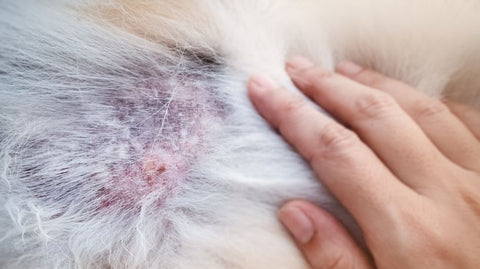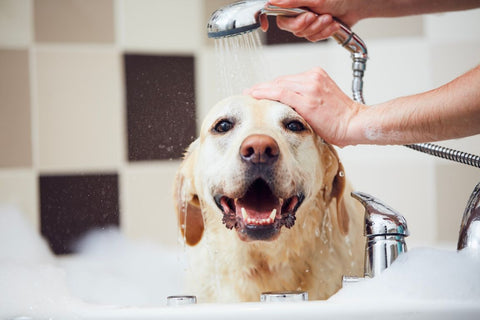

Skin Issues in Dogs & Cats: Causes & Fixes
A healthy coat and skin are important signs of how well your pet is doing overall. Sometimes, pets can have bothersome skin issues that make them scratch a lot. Let’s look at the main causes of skin problems in dogs and cats. We will also share some effective ways to get your pet’s coat looking great again.
What are common skin issues in dogs and cats?
Common skin problems in dogs and cats are allergies, hot spots, rashes, dry skin, and issues caused by fleas and ticks. You can help prevent and manage these issues by regularly grooming your pet. A healthy diet is important too. If there are any concerns, seek veterinary care quickly.
Common Causes of Skin Issues in Pets
Allergies
Environmental and seasonal allergies are a very common cause of skin and coat issues in pets. Allergens from food, environmental allergens like pollen or mold, and fleas can seriously affect your cat or dog's skin. This can cause severe itching, redness, and even hair loss.
Nutritional Deficiencies
Pets need the right nutrients to stay healthy, just like humans do. If they don't get enough important vitamins and minerals, your cat or dog’s body can have problems like flaky skin and dull coats.
Parasites: Fleas, Ticks, Ringworm
Fleas, ticks, and mites are tiny parasites common to cats and dogs that are well-known for causing big skin problems. These unwanted pests can result in insect bites that cause irritation and even worse health problems. They can also lead to other issues, like hot spots.
Infections, Sores, Mange
Bacterial or fungal infections, particularly in puppies, can occur when the skin's natural barrier is weak. This can lead to redness, swelling, and discomfort. This can also lead to things like ear infections or sarcoptic mange, both serious health problems for dogs and cats.
Types of Mange
There are many different types of mange that affect cats and dogs. Two of the most common forms are:
-
Demodectic Mange: also known as red mange or demodicosis, is caused by a mite called Demodex canis. This type of mange is common in dogs and usually affects those with weakened immune systems. Symptoms include hair loss, redness, and sores on the skin.
-
Sarcoptic Mange: also known as scabies, is highly contagious and caused by the Sarcoptes scabiei mite. It leads to intense itching, hair loss, and skin irritation in affected animals.
Underlying Medical Conditions
Conditions like hypothyroidism or Cushing’s disease can show up through signs such as thin hair, hair loss or frequent skin infections. Other underlying causes of skin and coat issues could be skin disease, dermatitis, or even something like poison ivy if your pet is outside a lot.
There are a couple common types of dermatitis, including acute moist dermatitis which is commonly known as hot spots. Hot spots are moist, painful, red sores that can appear suddenly and grow rapidly. They are often caused by excessive licking, scratching, or biting at a particular areas of skin. Keeping your pet's skin clean and dry, along with addressing any underlying issues, can help prevent hot spots from occurring.
Atopic dermatitis, a type of inflammation of the skin, is a chronic condition that causes itching, redness, and discomfort in dogs. It is often linked to food or environmental allergies, which can be triggered by various factors such as pollen, dust mites, or certain foods. Dogs with atopic dermatitis may experience recurrent ear infections, inflamed skin, and hair loss in affected areas. Treatment for skin issues in dogs usually involves a combination of medication, topical treatments, changes to your dog's diet, and addressing any underlying health conditions. Regular grooming, proper nutrition, and keeping your pet's environment clean can also help manage and prevent skin problems.
articleproducts1
Symptoms and Signs to Identify Skin Conditions in Pets
Not sure if your pet has a skin problem? Here are some common signs that can show something is not right:
-
Excessive scratching or licking – If your pet itches a lot, it might have allergies, parasites, or infections.
-
Redness and inflammation – Patches that look irritated, such as those associated with acanthosis nigricans, may be reacting to allergens or bacteria.
-
Flaky or dry skin – Itchy, dandruff or dry skin can come from poor nutrition or environmental causes.
-
Hair loss or bald patches – If your pet is losing more hair than normal, it could be from hormonal imbalances, stress, or parasites.
-
Oily or greasy coat – A coat that feels unusually oily may mean there is an overproduction of oil, often from imbalances or infections.
-
Odor or unusual smell – A bad smell can indicate yeast or bacterial infections.
-
Scabs, bumps, or sores – These may appear from too much scratching, infections, or flea infestations.
If you see any of these signs, it’s time to look closer at the possible reasons and ways to fix them.
Ingredients That Promote Healthy Skin & Coats
To solve these problems directly, adding specific ingredients to your pet’s diet can help a lot. Here are some ingredients that can boost health:
Vitamin C
-
Supports collagen production. This is important for skin elasticity and healing wounds.
-
Vitamin C is a strong antioxidant. It helps protect against damage from the environment.
Salmon Oil
Salmon oil is full of omega-3 fatty acids. It helps reduce inflammation, calm itchy skin, and gives your pet a shiny coat.
Hyaluronic Acid
This amazing ingredient helps keep moisture in the skin. It fights dryness and helps the skin feel soft and smooth.
Vitamin E
Vitamin E is an antioxidant. It fights against free radicals. This means it helps repair and protect the skin from damage. With vitamin E, your skin can stay healthy and hydrated.
Zinc Picolinate
This form of zinc is easy for the body to use. It helps heal the skin and lowers inflammation. It can also help stop dandruff and other types of flaky skin.
Biotin
Biotin, found in our Lignans and Melatonin Blend for Dogs, which is also called vitamin B7, helps make hair stronger. It stops hair from breaking and helps keep skin healthy overall.
How to Fix Skin Issues in Dogs and Cats
-
Provide a Balanced Diet: Give your pet food that is full of important nutrients. This can help stop skin and coat problems. Look for good pet food or supplements that have these needed ingredients.
-
Incorporate Supplements: Adding supplements like salmon oil, biotin, or hyaluronic acid can improve your pet’s skin and coat. They can also help fix any current skin issues in dogs and cats faster.
-
Regular Grooming: Brushing your pet’s coat helps make more oil, removes dead skin, and spreads natural oils for a glossier coat.
-
Treat Allergies: Talk to your veterinarian to find and treat any allergies your pet may have. A hypoallergenic diet or special cream might be needed.
-
Keep Parasites at Bay: Use flea and tick prevention recommended by your vet to keep your pet free of parasites.
-
Address Underlying Conditions: If your pet still has problems after changing food and grooming, see a veterinarian to check for any health issues.
articleproducts2
Seasonal Skin Care Challenges and Solutions
Each season brings new challenges for your pets:
-
Winter: Cold weather and indoor heat can make pets’ skin dry. A humidifier can help, and adding omega-3 fatty acids to their food is a good idea.
-
Summer: The heat and humidity may cause too much oil on the skin and hot spots. Brush your pet often and give them oatmeal baths to feel better.
-
Spring: Pollen and other allergens can cause issues. Wipe your pet's paws after walks and think about giving them anti-allergy supplements.
-
Fall: It’s shedding season! Regular brushing is important, and be sure your pet's diet helps their hair grow and keeps their skin moist.
Role of Grooming Tools in Managing Dermatitis
Using the right grooming tools can really help with managing and preventing skin issues in dogs and cats, like dermatitis.
-
Soft-bristle brushes are great for pets with short hair and for those with sensitive skin.
-
Deshedding combs help take away extra hair and stop matting in pets with long hair.
-
Hypoallergenic shampoos can reduce irritation and support a healthy skin barrier.
-
Flea combs are important for finding and removing fleas before they cause any skin problems.
Regular grooming helps your pet look good. It also stops skin irritation and infections from happening.
Skin Care Routines for Different Dog Breeds
Different dog breeds have special skin care needs. Here is how you can create a routine just for your pet:
-
Short-haired breeds like Labradors and Boxers need weekly brushing. They also require baths now and then to get rid of loose fur and dirt.
-
Long-haired breeds such as Golden Retrievers and Shih Tzus should be brushed daily. You should also trim their fur regularly to keep it healthy.
-
Breeds with wrinkles, like Bulldogs and Pugs, should have their skin folds cleaned often. This helps to stop bacteria from building up.
-
Double-coated breeds, such as Huskies and Malamutes, need undercoat rakes. This helps manage shedding in different seasons and stops skin irritation.
Comparative Advantages of Natural Remedies versus Medications
When dealing with skin problems in dogs and cats, pet owners often ask if natural remedies or medications are a better choice. Here are a few things to think about:
|
Factor |
Natural Remedies |
Medications |
|
Effectiveness |
Great for mild to moderate skin conditions |
Best for severe infections and chronic issues |
|
Side Effects |
Minimal, often improves overall health |
Can have side effects like drowsiness, dry skin, or digestive issues |
|
Long-Term Use |
Safe for daily use |
Long-term use may cause dependency or secondary issues |
|
Examples |
Salmon oil, vitamin C, biotin, probiotics |
Steroids, antifungals, antibiotics, medicated shampoos |
While medicines might be needed for severe cases, natural remedies can help improve your pet's skin and coat in the long run and offer various good health benefits. A mix of both, chosen with a vet's advice, is usually the best way to go.
Final Thoughts
Dealing with skin issues in dogs and cats can be tough. But if you follow the right steps, your pet can feel and look great again very soon. Remember, prevention is important. Regular care, a good diet, and the right supplements can help a lot. If you want your furry friend to have healthy skin and a shiny coat, take a look at Prana Pets’ natural supplements. They use powerful ingredients that can make a difference. Your pet should feel great every day!
articlebanners1




